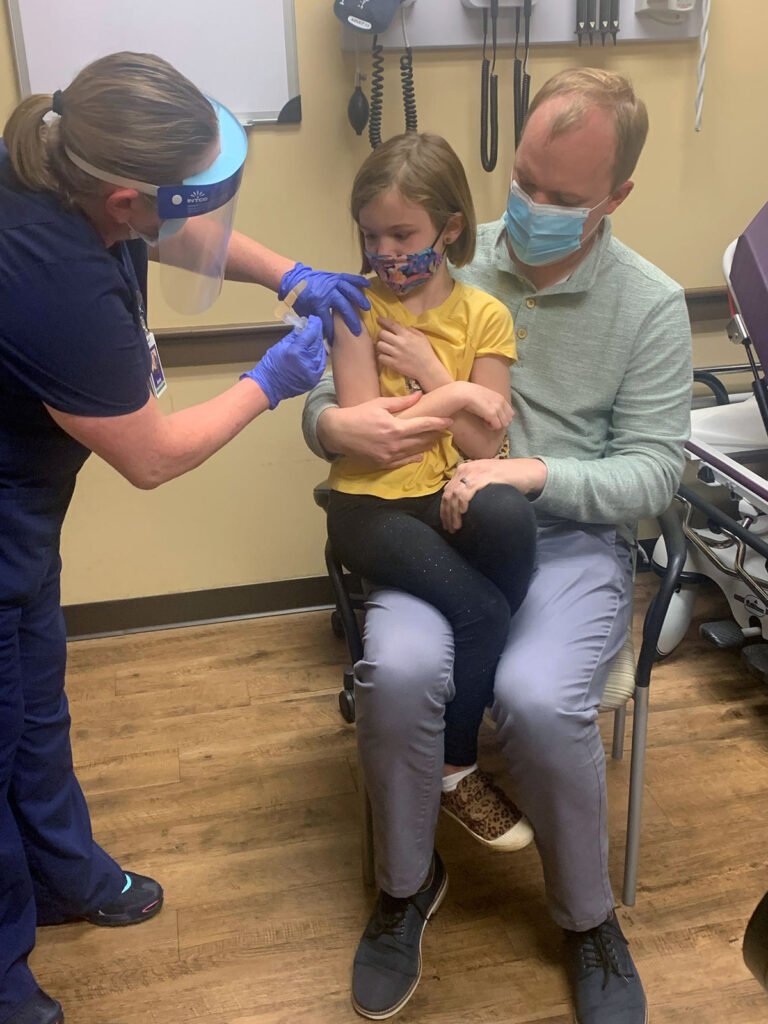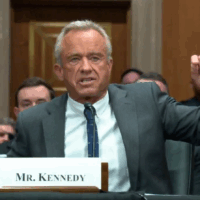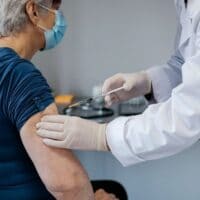It’s been three months since the CDC recommended Pfizer’s COVID-19 vaccine for children ages 5-11. After high demand initially, vaccinations have slowed in Kentucky and across the nation, according to an analysis by the Kaiser Family Foundation.
Federal health data show Kentucky ranks 38th in the nation for 5-11 year-olds who have received at least one dose of the vaccine. While three-quarters of Kentucky adults have received at least an initial shot, unvaccinated elementary school children remain a large source of spread.
Recently, Sutton Gilliam, 7, sat in her father’s lap at the Medical Center’s Urgent Care clinic in Bowling Green. Sonographer Irene Garrett prepared Sutton for what any kid her age might find scary.

“Just hug daddy and look at him, okay?” Garrett said. “I’m going to raise your sleeve and clean your arm off.”
Sutton clutched her favorite blanket and took a jab to the arm like a boss.
“I’m gonna pinch a little bit and I’m gonna poke,” explained Garrett. “Boop, that’s it! We’re all done! You did a great job!”
Sutton became the Medical Center’s 100,000th person vaccinated since the start of the pandemic. While a milestone for the hospital, the state hasn’t reached a significant milestone when it comes to vaccinating children close to Sutton’s age. Data presented last week during Governor Andy Beshear’s COVID-19 briefing showed Kentucky’s overall vaccination rate for five to 17-year-olds is 68%. But among children ages 5-11, only 20% have received at least their first dose of the vaccine. That’s below the national average of 28% for that age group.
For Sutton’s parents, getting her immunized against COVID-19 was never a question. Timothy Gilliam said he’s looking at the big picture.
“The more people that are vaccinated, the more effective they are,” Gilliam told WKU Public Radio. “We, as a family, believe everyone should be vaccinated. It was our decision to get Sutton vaccinated as soon as she was able to. It’s a small role we can play in helping defeat COVID-19.”
While the Omicron variant is the least deadly one yet, it’s still the most contagious. High illness rates have upended the school year, forcing many districts into non-traditional instruction, or learning from home. During a recent briefing, Governor Andy Beshear stressed the importance of the vaccine for adolescents.
“The 5-11 area, we have to do better,” Beshear said. “All the schools on NTI, where we want our kids back to school, we certainly need to get more of them vaccinated because that’s less virus circulating in those buildings.”
Many moms and dads bemoan remote learning and the challenges it brings to working parents. Yet when school is out, the 5-11 age group perhaps causes the most inconvenience for households and struggles the most with independent learning.
For some parents, getting their child immunized isn’t so much a philosophical challenge, but a logistical one in finding time to get their child to a pediatrician. The Bowling Green Independent School District has held several vaccine clinics at its schools, but the Warren County public school system doesn’t plan to do the same, according to Superintendent Rob Clayton.
“We’ve really tried to keep our focus on educating kids and staying out of the fray of what the medical experts do or don’t believe,” Clayton said in an interview with WKU Public Radio. “In terms of vaccination, we want our community to be made aware of where their child can be vaccinated, but the reality is, it’s an individual choice and that’s one we respect our parents to make in consultation with any medical professionals they seek on that standpoint.”
The Foundation for a Healthy Kentucky launched a public service campaign in December to address concerns of Kentucky parents about COVID-19 vaccines for children ages 5 – 11 years old. The High Five for Health campaign seeks to build confidence in the vaccine with print and digital messaging at doctor’s offices, schools, and youth organizations.
If infected by the virus, most kids only have mild symptoms and rarely die. Some parents who are vaccinated themselves are more cautious about getting their kids vaccinated, in part, over concerns about potential long-term side effects. But Timothy Gilliam, who immunized his seven-year-old daughter Sutton, says he was convinced by the research.
“Every parent’s gonna have to make their own choice and it’s never easy to make these types of decisions for your children. But do your research, listen to the healthcare community. The conclusion we came to was that she should be vaccinated and we’re happy that she is,” Gilliam said. “It’s an added level of protection. Sutton does attend public schools and it adds a little comfort that she’s that much safer from contracting the virus.”Seven-year-old Sutton Gilliam of Bowling Green became Med Center Health’s 100,000th person vaccinated since the pandemic began.
The vaccine is approved by the American Academy of Pediatrics and other leading health care groups who say the benefits of the vaccine outweigh the known and potential risks. Dr. Steven Stack, Kentucky’s public health commissioner, adds that the vaccine not only helps prevent infection, but can prevent complications from COVID-19.
“They’ve proven now that it does reduce the risk of multi-system inflammatory disease that sometimes strikes children a couple months after the initial disease, and sometimes ends them up in the intensive care unit,” explained Stack. “It’s uncommon, but you don’t want that to happen to any child, and if the vaccines prevent it, it’s well worth getting the vaccines.”
Sutton Gilliam was more interested in the immediate payout.
“It only hurted a little bit. I was very brave,” she boasted. “I get to shop and I get $50 from my nana.”
Persuading parents to get their younger children vaccinated is crucial not only to sustaining in-person education but also to containing the pandemic overall. Health experts may soon have more convincing to do. Pfizer asked the FDA this week to approve its COVID vaccine for children under five.






